Swedish death cleaning?
What the heck is that you ask? The latest hot declutter trend. That's what.
And there's a new book out all about it.
I'll explain how it works practically in a moment. But first, why it is so important and how it can help big time, if you - and your family - are drowning in clutter.
And feeling utterly rubbish about your total inability to get rid of it or stop more coming in.
(There's a big load of psychology coming up so whizz to the bottom for the practical tips, if that's not your thing. Or check out my simple FREE declutter guide. It includes checklists, daily challenges, selling tips and more.)
1. The Gentle Art of Swedish Death Cleaning
The Gentle Art Of Swedish Death Cleaning was written by Scandinavian grandma Margareta Magnusson and has been a big bestseller because it has a new take on the crazy epidemic of clutter we are all facing.
Clutter is literally a disease that is causing misery in households across the world and seriously hurting our families' mental health. Many of us are getting into debt filling our homes with stuff that doesn't make us happy.
And then do you know what we do? We cling on for dear life to all that stuff making us miserable AND finally pass it onto our kids. Or our grandkids. Or some distant relative.
Because wading through rooms and boxes and garages and basements and attics full of clutter will really make our family happy when they're grieving and overwhelmed, huh?
When we step back and look at ourselves, it's crazy. Why the heck would we keep doing something that makes us so unhappy? And then dump all that misery on our loved ones?
“A loved one wishes to inherit nice things from you. Not all things from you.” M. Magnusson
Well the culprits it turns out, are three deep down instincts we all have in spades, that explain our weird psychology of clutter:
- Our clutter instinct
- Our hoarding instinct
- And our fear of death
And it's these villains Magnusson takes on in Swedish Death Cleaning by unleashing a secret power we may not realise we have!
I'll explain now how these baddies took over - we'll dive deeper into the psychology - but if you've got the gist, whizz to section 3 for Magnusson's practical ways to fight back.
2. The Psychology Of Clutter
Our Clutter Instinct
As humans we instinctively like stuff. All the pretty, shiny, useful stuff we dream up and make with our clever hands.
And from when we're tiny, we grab at it. We do this, partly because it's pretty and clever, but partly because we're anxious.
I mean, the world's a scary place isn't it? And stuff comforts us. Sort of. We think.
But when our clutter instinct joins forces with our hoarding instinct and our fear of death, oh boy, we are in trouble!!
Our Hoarding Instinct
Back in the day, hoarding was useful. It got us through bad winters and famine. And fear of death is pretty essential for survival isn't it?
However, they both increase our natural tendency to grab at and cling to stuff and throughout history we humans have got ourselves into a right old mess with clutter.
Take the Egyptians for example.
They tried to take all their clutter with them when they died, rather than palming it off on their relatives. I'm not sure which is crazier!
But basically whenever times got tough - Game of Thrones style - we humans hoarded.
Our world was turned upside down and we didn't know how it would turn out, so we held onto stuff. Lots of stuff. Just in case.
Which is understandable. If there are monsters on the march, we want to be ready for them.
And most of us had a secret weapon to keep our hoarding sensible: we were just too poor.
BUT 200 years ago, a new monster appeared. A Frankenstein, we created ourselves.
The Clutter Monster
Suddenly, the clever machines - we humans invented - could create clutter at a volume never seen before in the whole of history.
Even poorer people could indulge in more pretty stuff. And it soon became a problem.
Victorian novels are full of characters who collect stuff. And can't stop. Authors like Charles Dickens saw the monster for what it was: an addiction dragging families into debt.
And Dickens know this first hand.
His dad, John went to prison because he kept buying pretty china plates, he couldn't afford.
How crazy is that? His family ended up in prison with him because he couldn't stop shopping for stuff he already had!!
Scary, huh?
BUT these days crazy clutter hoarding is an epidemic. And MOST of us suffer from it. So don't think clutter is your personal failure. It's not.
The Crazy Clutter Epidemic
Today's machines let some people capture huge wealth by spewing out crazy volumes of clutter at lower and lower cost.
Skilled jobs are lost but the clutter keeps coming and every day we are bombarded with stuff at cheaper and cheaper prices.
Clothes. Toys. Gadgets. Furniture. Food. Entertainment. More AND more of it.
It's more than we could ever have space for. More than we could ever have time to enjoy.
BUT it is so hard for us to resist, because we are human and we like stuff and once that stuff has invaded our homes, it is even harder to let go.
And that's because we are wired deep down:
- To cling onto things
- And to hoard in case of bad times
And because we are scared of dying, we dump our crazy clutter on our families when we die.
It's all totally understandable. But it is no less crazy than the Egyptians burying their clutter in their pyramids and we have to do something.
Because millions of ordinary families now struggle with clutter chaos causing:
- Family conflict
- Debt & financial difficulties
- Stress, anxiety and depression.
Honestly the emails I get in response to my declutter newsletter are heartbreaking. People are hurting out there.
So the last thing we want to do is pass on that pain to our loved ones. And this is where Margareta Magnusson's The Gentle Art Of Swedish Death Cleaning comes in.
Her simple advice helps us slay the clutter monster right here, right now, so we don't bequeath the battle to others.
3. Putting Swedish Death Cleaning Into Practice
The Gentle Art Of Swedish Death Cleaning is full of practical decluttering advice based on Margareta Magnusson's own experience of letting go of loads of her stuff so she didn't pass on that burden to her children:
She did this as a pensioner - who's had 5 kids and 17 different homes! - but her approach is relevant for all of us, however old, and really highlights that decluttering is a family affair.
And it all starts with one big declutter question, Magnusson tells us to ask.
The Big Declutter Question
We're used to asking whether stuff makes us happy - whether it sparks joy for us - but Magnusson tells us to ask:
Will anyone be happier if I save this?
The magical power of this question is that it makes us start talking honestly in our families about the few things that truly make us happy.
And this unlocks a way to let loads of stuff go that is incredible joyful: and that's gifting.
It might all sound a bit airy fairy but it is easy to put into practice with these simple steps.
Simple Steps To Start Gifting
- Recognise it's odd to hold onto so much stuff that doesn't make us happy
- Even odder to dump it on our families
- Accept little value in lots of things we own
- Commit to living with only things that bring happiness as "benefits incalculable"
- Get the family talking about the things that truly bring them happiness
- Gift things they can enjoy more than you
- Talk to all your friends and if they can enjoy more something you don't love, gift it.
- Don't make assumptions about what people will enjoy, ask them
- Make a party of it invite people round to see what you're ready to pass on and encourage them to take anything they'd love BUT without any obligation to
This thoughtful gifting away of belongings brings deep joy. And we shouldn't wait til old age to do it. As we move through milestones in our lives, we need to pass on things that will now make other people happier.
This is a brilliant habit to get kids into. It really helped my 9 year old let go of toys that will make someone else happier.
And once you start looking at stuff in that way, it's amazing how much it frees us to let stuff go: all those craft supplies, books we'll never read again, the kitchen gadget still in it's sealed box. Someone else could truly enjoy them.
But it also lets family and friends be honest about stuff they don't love and don't want.
And which we need to "gift" in a different way.
The Stuff No One Wants
If we cannot find anyone to gift things to, Magnusson advises us to:
- Donate them to charity
- Or sell them and make a donation
Which seems blindingly obvious, doesn't it? But it is now much easier to pass this stuff on because we have got into the "gifting" mindset.
It turns out, we have a deep instinct to "give gifts", which we can use to fight the monster our hoarding instinct has become.
The Gifting Mindset
So the "gifting" mindset can be super helpful for people who totally resist decluttering.
It appeals to all our better angels, and may just be the breakthrough you need, for hoarders in your family, old or young.
Gently create opportunities for them to gift. Rather than nagging them to declutter.
The huge power of this - like lots of the ideas in Swedish Death Cleaning - is it makes us look at our clutter differently.
And not just us but our families too.
Practical Tips For All The Family
The book is a must read for baby boomers.
Magnusson combines handy tips on downsizing your way to retirement freedom with refreshingly honest advice to avoid dumping clutter on your kids when you die.
But tips like these work for all ages:
- Avoid emotional clutter at the start but recognise different members of the family will be emotional about different things
- Keep just one special box of mementos you can truly enjoy revisiting
- Make a "death kit" with hard copies of passwords and essential financial details, it sounds morbid but will make life so much easier if something happens to us
- Focus on what makes us happy and stop worrying about the rest and let it go.
- Stop treating ourselves with things and learn to enjoy things without owning them
If you've struggled to declutter, Margareta Magnusson's Gentle Art Of Swedish Death Cleaning could be your breakthrough.
Especially if you're drowning in your partner's, kids' and parents' clutter as well as your own.
The secret power of gifting may be just what your family needs to start fighting back and defeat the the clutter monster.
I really hope this helps to get your whole family decluttering.
For more help do check out my FREE declutter guide which shows how I decluttered breaking all the Marie Kondo rules. And includes:
- No mess methods
- Handy checklists
- Daily challenges
- Hotspot busters
- Selling tips
- Motivational support

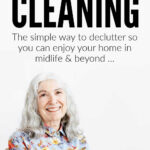
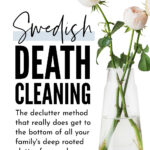
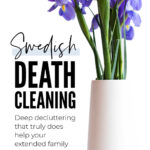

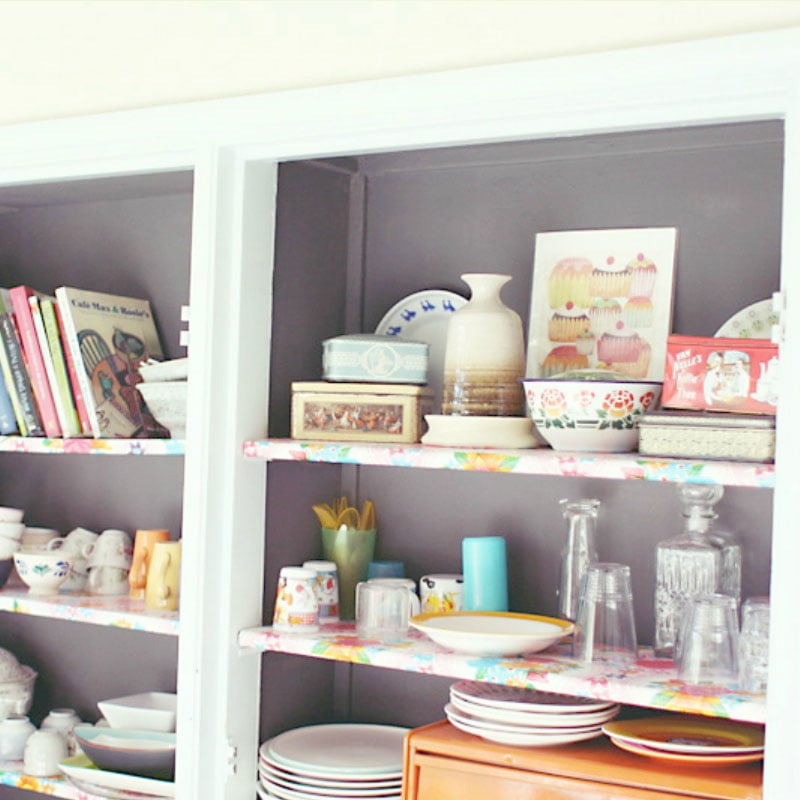
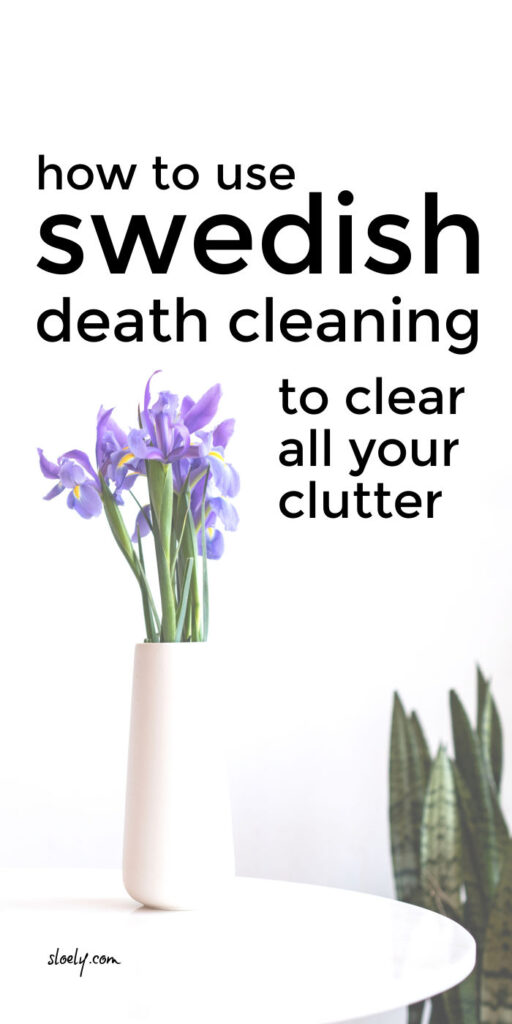
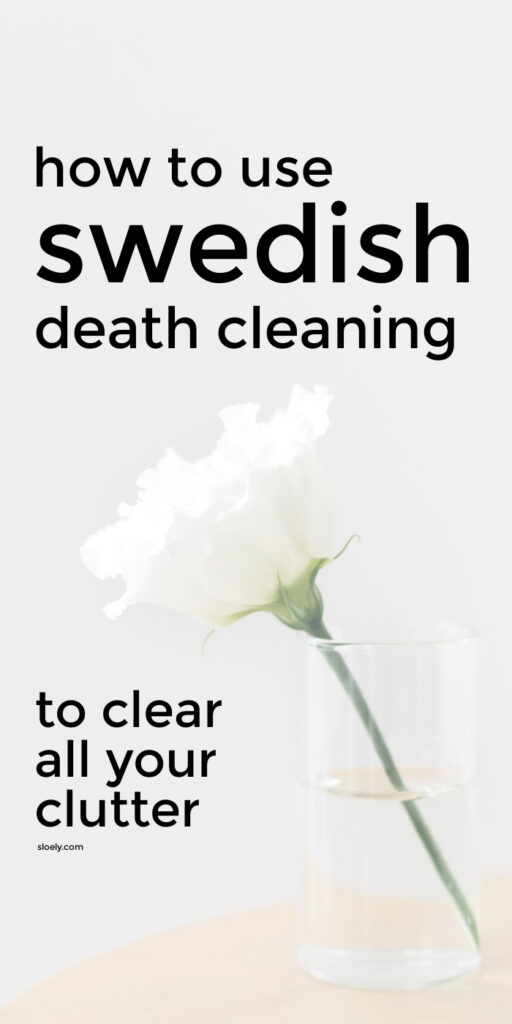
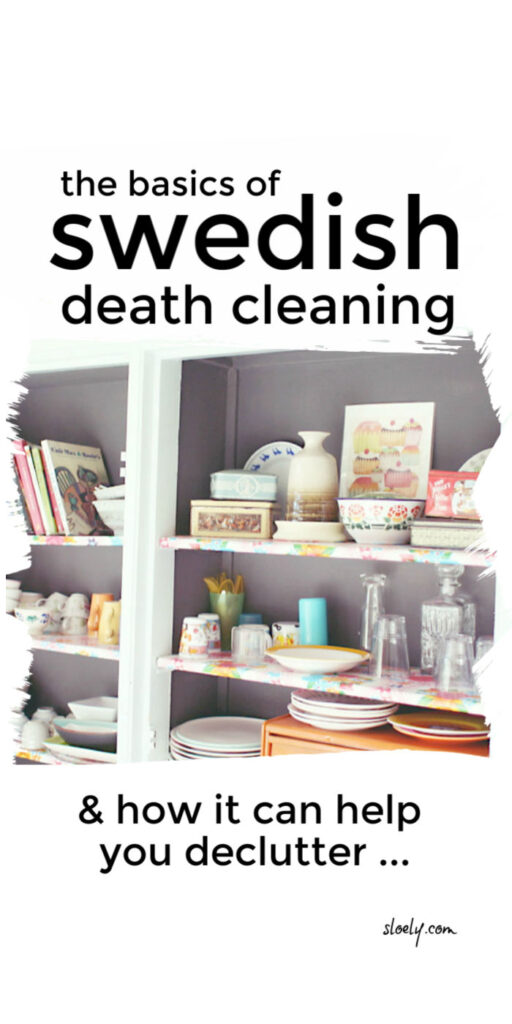

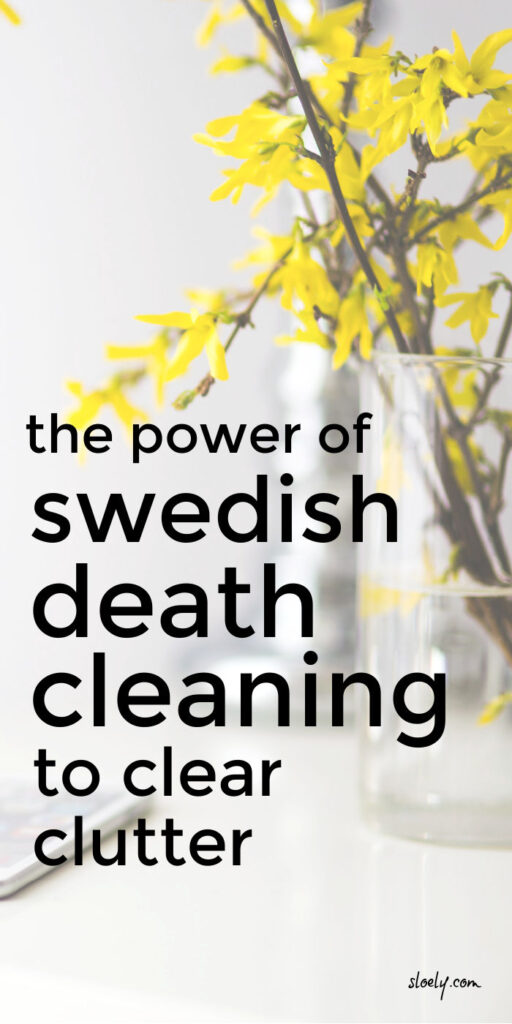
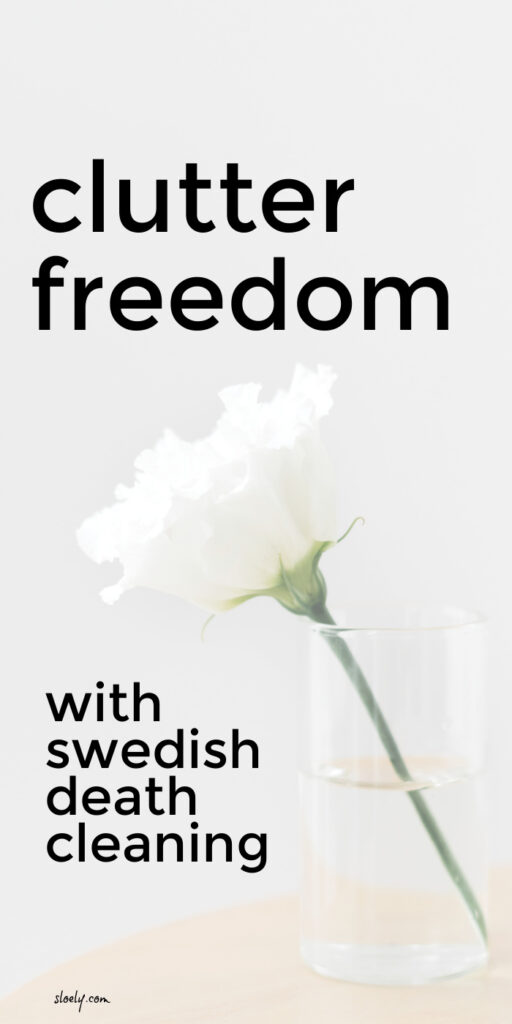
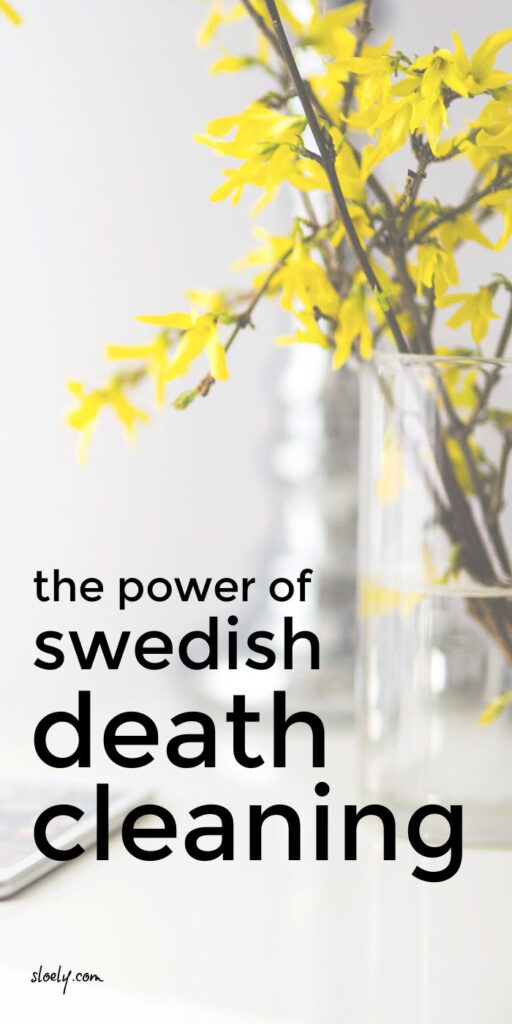




Lorna Bedi says
A brilliant article. There is a emotional relationship to our clutter. My mother was a hoarder, brought up in the war years when rationing was on. She saved everything "just in case", and when she did have a bit of money she couldn't resist a "little bargain".It was a nightmare sorting through bags, boxes and piles of inner soles, garden trowels, string, even sweets.Mostly out of date! I think I kept about five items in total. And I felt so rotten just disposing of her things, but it was just rubbish!
I'm not much better because I kept everything my scalp of paper my kids scribbled on, every ticket to shows, school reports, bit of memorabilia to do with their childhood. This week I have sorted through it all and put it in a memory box, throwing a good 50% away before handing to them. I know why I did it, and it's taken me years to change the habit. I'm only 51 but I don't want my kids to have the stress of thinking they can't throw stuff away because maybe it was precious to me. Its up to the individual of course but I'd also rather help my adult kids now when I can, when they need it. So while I declutter I offer it to them now. Mostly they go "No thanks mum!" so maybe I'm more like my mum than I'd care to admit!
Celeste says
Wonderful article... I had a wakeup call when my friend's husband died a few months ago. A couple of friends and I helped her sort out her house because she was downsizing.... what a nightmare that weekend was!!
Anyway.... I vowed I would not leave my daughter a similar disaster when I die.
That idea... which is the Swedish Death Ckeaning :), has helped me declutter my home!!
And I am sooo thankful I did start! Filling bags and bags of junk that has been sitting in drawers unused for years... I actually felt embarrassed, but also grateful that I am doing it and not leaving my poor daughter to deal with it!!!
Another good hint for keeping or not is to imagine I am moving to another house, and I ask myself "would I take the time to pack this, transport it and unpack it?
Loved your post!!
Alice says
It's such an eye opener isn't it Celeste when you go through it? Just overwhelming to have to declutter a loved one's things in all the pain of losing them. I like your moving tip it's a good one.
Colleen says
I'm 35 and this idea is so spot on. God forbid something would happen to me or my husband I would t want my family left to deal with junk. I've started throwing so much out weeks ago and my house feels lighter. I feel lighter.
Alice says
That's so great Colleen. I know totally what you mean when you say you feel lighter - it's wonderful isn't it?
Norma Foster says
Love this article. It touched me because I had the 'pleasure' of cleaning out my parents home of 52 years of clutter. My mother was such a hoarder, I found items from her first husband which she divorced in the late 60s. Later in life she was the $1 store queen. I wanted to cry at the dishes and silverware she only used at holidays. Some I use in my home daily. The pain of cleaning out my parents home, made me do 2 things: if I don't love it, don't buy it and come home and declutter my own home.
My mother felt she needed to keep stuff in case somebody could use it or because she didn't like empty spaces. She kept stuff in her basement that she no longer used later in life because, she didn't want any 'emptied out' space in her house.
Alice says
So glad you liked it Norma. It really is a painful process isn't it? And so sad when we have lovely things like your mother's dishes we have no space or time to enjoy because of all the totally-not-lovely-at-all clutter we cram our houses with.
Lisa says
Love this. After inheriting dead relatives stuff and cleaning out two houses we are over it. Now we are purging our own house to releive burdens from our children and grandchildren. Thank you.
Alice says
So glad you liked it Lisa. It's so painful isn't it going all our relatives' stuff? And great that in relieving the burden for your children and grandchildren, you'll actually get to enjoy all your space again 🙂
Mary says
When my mom and her sister passed away,my sisters and I each took what we wanted. They had lovely things. But their childhood home was filled with beautiful things. We donated huge amounts. When I had to downsize this last year,it was awful. I sadly parted with family pieces that I simply couldn't use. It was painful and I was filled wirh guilt. Now settled into a small house I have unpacked the small important things. These are all I can display. I now feel more at peace.
Stan Quick says
Many boomers are going to need institutional care of some sort. I am one. I have also seen what hoarding can do. The fact is nobody can use most of it, It means little to someone else. My problem is books and useless kitchen gadgets that only show up after the meal. So yard/garage sales, charity donations, used book stores or sales for charity ( put it back where I found it.) Do I need the empty bookcase etc.?
Janett says
I finally had a frank conversation with my mother. I rent and move every few years. I can only take the useful and a few sentimental peices. I have no idea what is my great-grandma's, grandma's, grand-uncle's etc. I told her she has to curate and catolog for myself and my 2 half siblings or it will just be picking a couple of "shinny" things and donate the rest. She agreed with me. Hearing that I was willing to help with the attic, her significant other went and rearranged so I would have room to work up there. It truly is an epidemic problem.
Derek Hines says
Great tips! I had never heard of Swedish Death Cleaning, but from experience, I know that it's not a good idea to leave clutter to the next generation. I've had to declutter after my parents passed away and it's a difficult task! Thanks for writing.
Katie @ Retiring To The Road says
I was shocked by the name of this method when I first heard about it, but it makes so much sense. I will say that as the person that has been in the role of "declutterer" after a loved one has passed, I really wished we'd had discussions about the stuff earlier. Not only is it a physical task to sort through stuff, it's an emotional one. It was difficult to decide what was meaningful and worth keeping and what could move on. It would have been wonderful to know the story behind the stuff and to start the purging process WITH the person that we were grieving.
Louise says
I get this completely - but in some way, clearing out a persons home and belongings is almost part of the grieving process - a chance to laugh and reminisce and get surprised and cry over old cards and photographs. I am in two minds after clearing out my fathers house after he had passed last year - as it was cathartic but I am now left with a lot of his stuff which I just couldn’t bear to part with but won’t be used. I might need to read this book!
Melissa says
This is a great article. I have made great strides on my home for years with this very thought, unaware it had an actual name. My best friend died after being in a coma for 30 days, at the age of w4. Her family was unable to clean out her very full apartment. I had to go through each item and deciding were it would go. There were a number of personal items I am sure she would have been horrified to know i had to find. This made me question my own possessions.. .what if this happened to me one day? I would not want someone having to sort through such large disorganized amounts of "things".
Emily Aagaard says
Great post! I've never read about Swedish death cleaning and where the idea comes from, but this is super interesting! Thanks so much for putting this info together.
Emily Aagaard // https://www.emilyaagaard.com
Sandra says
I totally am on board with decluttering. I agree it gives you a freeing feeling. I have 2 questions. 1. I'm married to a hoarder, do you have any tips? He goes through the rubbish and pulls out things that are broken "because I'll fix it, one day" (my tactic to date is filling my friends rubbish bins). 2nd question. .. I feel guilty about things going to landfill so I donate to op shops, however am I just helping other people collect clutter??
Chloe Sutherland says
I admit, I'm happy to add to someone else's clutter. I feel like my journey required me to acquire enough stuff (and enough stress from all the stuff) to realise the problems associated - some things, it appears, you just have to learn yourself. And I'd much rather someone come to their own realisation with my old stuff instead of potentially buying the same or similar items new and using up precious resources. It makes me happy knowing things will pass through a few more hands before eventually ending up in a tip somewhere.
And, on top of that, you don't know who will buy your stuff - maybe your discards will go to a family who really needed that item and would not have had the means to buy first hand.
Jill says
I hope there will be some helpful responses. I’m in the same situation. My husband doesn’t seem to part with anything!
Sue Brogan says
This is the best article on decluttering I have read! It has propelled me on my new journey to not burden my children with my junk. Both my husband’s parents and my parents had so much stuff, we are still sorting through it. I am determined to make it as easy as possible on my kids. Thank you for your words, they were very encouraging to me.
Sue Brogan
Hildanotmyrealname says
What a helpful article. My mother used to tell people, IN FRONT OF ME, that "When I die, ______ will pull up a big dumpster and get rid of everything." Also she'd say, "I'm not concerned. My kids can deal with it." So now I am. Many items left were from her siblings, in-laws' deaths and not even her items! And unopened, still priced yard sale items she garnered. My husband and I are preparing for our third 550 mile trip there to dump in the second 30 cubic yard dumpster and make repeated hauls to local church and humane society thrift shops. My brother, who is a hoarder, is no help and we try to sneak in so he can't try to keep more "loot" to take to his home, which barely has a path for his wheelchair. All so sad, on so many levels. Grieving starts to turn to anger and then to guilt. The positive side is increased awareness, so I don't do this to my children.
G.J. says
Hallelujah! I thought it was just me! In the past three years I’ve lost both my parents. In the past eighteen, all my grandparents. My parents died tragically early and I am an only child. I inherited a four bedroom house with a full basement and a two car garage. After my grandparents died my parents boxed up anything that might be valuable from their houses and actually BUILT a walk up loft in the garage to hold everything. With that and the fact that they kept everything from VCRs and TVs to wall art and lamps even after the upgraded to newer looks and technology left me with a house filled to the gills with things I don’t need, like or want. Nearly four generations of ‘stuff’ shoved in one home. It’s a good thing I didn’t want to sell the house.
After examining the extent of the existing hoard I stood in the backyard and screamed at the sky;
“Why do you hate me so??”
One of the worst things was I had to go through the expanded kitchen, the extra refrigerator and the 6’x8’ area of the basement my mother used as a pantry and throw out nearly twenty years worth of expired canned, boxed and bottled groceries. The town picks up one garbage and one recycling bin a week. I would have needed to pay the junk people to come even if all I had was the food.
A year and a half later, the living areas have been cleaned out and filled with my family’s furnishings. There are still three closets that haven’t been touched, the whole loft and piles of boxes we had to pat to store until I could go through them.
I recently realized that I will likely need to do no more than pop each box open and take 30 seconds to decide if there is anything valuable enough that requires selling and send the rest to donation. It will take too much time, effort and money otherwise.
I’m looking forward to a simpler existence, although it may be another year...
Alice says
You are so not alone. It truly is a crazy situation all our families have got into isn't it? We cannot possibly enjoy all the things we're being burdened with and the time it takes to go through is a nightmare but it sounds like you've made amazing progress. That simpler existence really is worth it.
Shannon says
I respect your hard work. You sound like an excellent daughter. I am in the process of selling, giving, and donating many, many items so that no one has to deal with them. I am only 56 but you never know. Again, kudos to you.
Jeannie says
I will begin my comment by admitting my own home is not in perfect order, but trying to live alone efficiently in <650 sq ft has taught me that I cannot have it all. Getting my friends to stop buying me gifts has been futile as they all live in large homes with multiple closets, basement and attic storage and garages. If one thing comes into my space, whether it is a kitchen gadget or a blouse, one has to go!
I suffered after clearing out my Father's possessions when he died 30 years ago as grieving and clearing all of someone's possessions is a cruel and horrible thing to go through.
I have recently moved my Mother out of her home of 35+ years and into assisted living (which is a substantially smaller space). Clearing her home with her asking me to take all of the things that would not fit into her new home, or her wanting to take every single thing to new space (eg, egg cups unused for decades, gifts still in boxes also decades old, shopping in bags they came home from the store in which were never unpacked but just piled into storage, a linen closet with yellowed linens growing moldy, etc.) was beyond painful and took over 6 months to accomplish with most of it going to charities, some neighbours, some friends, the garbage and spending over $1,500 for two 1-800-got-junk pick ups.
All of my close friends have suffered the same ordeal of clearing their parents' houses and I would beg anyone reading to be considerate of their children and relatives who have to deal with the aftermath of their death (a depressing but realistic point illustrated matter-of-factly by Swedish Death Cleaning).
I am finished clearing other people's "stuff" and look forward to the next move of my own - into a clean, minimal, happy, healthy space where I can relax and keep my mind clear. If I pre-decease my two best friends - the executors of my estate - I hope to leave them with an easy space to clear with absolute minimum fuss. That's my fantasy.
Alice says
Thank you so much for sharing Jeannie. This is so powerful. So many of us are struggling so much with our families stuff. I love the image in my mind of your "clean, minimal, happy, healthy space" - it sounds beautiful xx
MJ says
Great article! Love the idea of the "gifting mindset." That's one solution we hadn't considered and a great way to ease the tension of decluttering. Thank you for sharing!
Christine says
I had never heard of Swedish Death Decluttering but I’m so glad I read your piece. We recently moved from England to Spain and threw out lots of clothes and furniture in preparation but we still moved out 200 boxes of stuff plus our furniture and it took months to unpack it all in our new home. Everything fits, works and isn’t damaged.......but there’s just too much of it. Retiring from work had got us both throwing out suits, briefcases, and a study full of paper and computer peripherals......but now I’m discarding more coats, jackets and items formal as we live in casual things and the climate is so different. Even our two favourite lounge chairs are unsuitable as they’re covered in tartan wool fabric, perfect for England but not hot and sunny Spain, so as we are further adjusting to our new life, the things we use totally change. No more big dinner parties, so no need for all the glasses and china for Chinese food, Indian etc.as it’s all about casual barbecues now. I continue to declutter every day of my life and have been getting despondent, not least because my husband is a committed hoarder......’just in case’! I have now got a new way of looking at this issue and I feel energised. I have just been diagnosed with a serious illness and reviewing my things in my sons’ eyes will help greatly. I hope it will be a long time to come, but when they eventually have to go through my things I hope they won’t be daunted as we were when our own parents died. Thank you so much!
Shannon says
This is so excellent. I shared this with my sister and several friends. I have to ask, though, why do people who write excellent articles feel the need to put super in front of words. It is simply poor English. Please, this is in no way disrespectful, but I stop reading when I see super used. Thank you again for this helpful and insightful article.
H. Swinney says
I have been decluttering slowly. I get tempted to keep things because my kids or a friend might want them.
Well. I finally wised up and now take a picture on my phone of the item(s) right then and there and send the photo to my kids or friends. If no one claims the stuff within the day, out it goes to donation.
This has helped me with feelings of "I should give this to ____ " and " ____ might want it".
In reality (outside my own guilt/hoarder thoughts) very few things have been claimed by friends and family. Most went to donations.
Madison says
Amazing thoughts and tips. I agree with you that most people suffer from a lot of clutter. I definitely will check this book out. This book could be a breakthrough for me too.
Joan Bruce says
After I suffered a major illness and was in hospital with little chance of recovery, my two well-intentioned children attacked my cluttered home. I recovered and was housebound for a year. I had carers to help me. We couldn’t find anything we needed because it all was rearranged. I wish I had decluttered years ago. I’m now doing it as my prognosis is not good and I don’t want them to have that same experience.